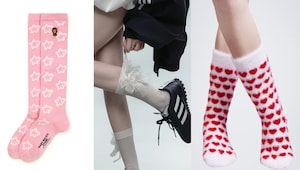Calling Plus-Size Women “Confident” Is Actually an Insult

I always know when it’s about to happen. The thing is, it happens to me a lot. A recent example: I was out with friends on a Friday night, dancing to my favorite song. Then, out of the corner of my eye, I saw her on the other side of a small crowd, wiggling toward me, trying to make eye contact. There was no point in making a beeline to the bathroom or otherwise attempting to avoid a run-in—she would just find me later and say The Thing she was about to say anyway. So I kept up my little two-step and waited for the inevitable comment I’ve come to truly resent:
“Girl, I just LOVE your confidence!” this total stranger shouted across the music, a grin spread across her face. “Thank you!” I mouthed back, trying to be as gracious as possible despite the embarrassment and annoyance I felt.
I was meant to receive her words as a compliment, to be grateful for the validation—even though I hadn’t done anything different than dozens of other people in the room. Except I wasn’t complimented, because the reason she had singled me out was obvious: I was the only fat girl out on the dance floor.
People talk about confidence like it’s some magic potion that bestows the ability to transcend whatever your “issue,” accessible to anyone willing to do the work of finding it for themselves. (That’s different from the daily practice of trusting yourself and truly believing that you have the right to love yourself simply because you exist, which is how I define confidence and something we all deserve to feel.) But confidence isn’t the badge of honor or suit of armor that people think it is when they presume it’s the sole reason I am able to show my face in public.
This is a subject I spent a lot of energy unpacking last year as I wrote my first book—a memoir/manifesto about trap feminism, a phrase I coined to examine and express what liberation looks like for Black women from the hood. The process raised a lot of questions about the role confidence has played in my life and those of women around me. Like: What aren’t we saying when we cringe at the thought of being called confident? And how could something that makes me cringe—even though I have a very healthy sense of self—also be integral to living my best life?
I thought about the parts of myself that have been deemed unworthy of pride or love by other people and about all the experiences that have caused me to feel bad about myself. Most of them were the result of anti-Blackness, fatphobia, respectability politics, toxic diet culture, featurism, and homophobia. What I eventually realized was that calling someone “confident” can be a slick way of commenting on that person’s perceived inadequacy; that night at the bar and on countless other occasions, it felt like an erasure of and a spotlight on certain “desirable” qualities the commenter assumes I lack.

You can’t solve everything with a bigger dose of self-love.
In some ways, it’s analogous to being told you’re “pretty, for a big girl,” another backhanded barb of recognition that stops just short of acknowledging attributes plus-size women might actually find endearing to be praised for—like putting together a cute ensemble, giving an innovative presentation at work, or even killing it on the dance floor. At the same time, chalking up any of the above to confidence implies that we are ill equipped to pull off the cute ’fit, rad PowerPoint, or sweet moves *because* we’re fat. Which adds up to plus-size women being applauded for having the courage to do things that no one thinks twice about when smaller people do them, like yoga or traveling abroad. The subtext: I didn’t expect to find you so smart/beautiful/funny/talented/athletic, etc). Your strong sense of self must be doing all the heavy lifting. Now that’s some shady shit.
Yet confidence is hustled across the internet, to women of all sizes, as one of the keys to living a more fulfilling, happier life. From fitness and wellness influencers to entrepreneurial “girl boss” accounts, loving yourself more is held up as the ultimate tool for overcoming whatever adversity you’re up against.
It’s also a sneaky, Instagram-friendly affirmation that puts the onus on the individual to triumph over challenges while sidestepping the questions we should really be grappling with as a broader culture. Like: Do fat folks need to love themselves more—or does the wider world need to reckon with the damage of systemic fatphobia? Or: Should women embrace their own unique beauty—or should society work harder to dismantle a culture of toxic beauty standards? You can’t solve everything with a bigger dose of self-love.
For plus-size Black women, the insistence on self-love being the answer to everything is so pervasive that, sometimes, it’s hard not to internalize it as the answer. For years—as a fat Black woman in college, working in politics in D.C., being a “media girl” in New York City, and even just posting pictures of myself online—I felt pressure to carry the torch of confidence with me everywhere I went.
If someone called me confident, I basked in it and affirmed their observations. I took advantage of every opportunity to call myself a bad bitch and made sure that I was ready to take on every room I entered with self-assured energy. I didn’t hate myself. But I needed to take up as much space as possible to telegraph my own self-assurance to the world. I’ve only been able to relax a little as more plus-size folks have spoken out about projected and performative confidence, collectively rolling our eyes at unsolicited accolades about our self-esteem.
Confidence is an amazing mental and emotional resource to tap into if you can. But it’s a symptom of being well—not the source. For me, the basis of that wellness is standards: Not allowing myself to be uncomfortable when I don’t have to, or be mistreated by others, has enabled me to create a life I truly love. Sticking to those standards keeps me from feeling beaten down by everything going on around me and allows me to speak up on behalf of those who need more empathy and care from others.
So, yes. I’m confident. But I don’t need anybody to tell me that. Because after reckoning with the framework of self-worth, I’ve finally been able to set a standard for myself—one that doesn’t require that I pretend to be flattered.
more from Life

How ‘The Housemaid’ movie stacks up to the book

Emily is heading back to Paris for season six but is this where we say goodbye?

Keeping the camera on or off: What’s the right way to go about professional meetings?

Four celeb-inspired salad recipes are what January lunches should be made of

Fun cosy socks you should invest in while winter is still around

Every couple should fight (Taylor and Travis included)

Choremance is the new dating trend making everyday errands feel romantic

Why going offline is suddenly Gen Z’s favourite flex

It's the Year of the Horse and here's what it means for you

If a man wears this, date him….
